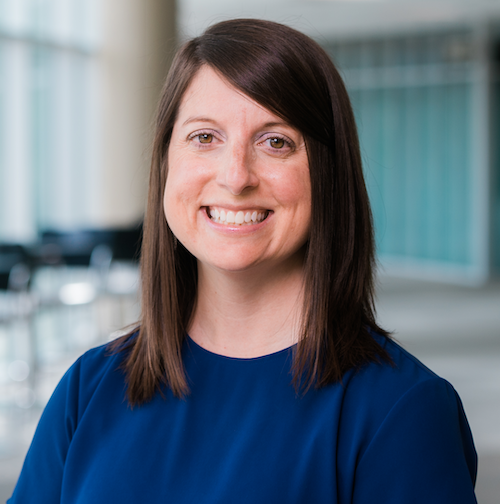Merida Grant, Ph.D., director of the Trauma-Related Disorders Clinic, and Rebecca Rampe, Psy.D., director of the Initial Psychotherapy Practicum Psychology Clinic and the Developmental Trauma and Traumatic Grief Clinic, are conducting research to learn more about treatment options for post-traumatic stress disorder (PTSD) and other trauma-related disorders. Merida Grant, Ph.D.
Merida Grant, Ph.D.
PTSD is a psychiatric disorder that occurs in adults and children who have experienced a traumatic event or series of events. After undergoing a life-threatening or life-changing event, individuals may reexperience upsetting memories, feel on edge or have trouble sleeping. Activities such as going to work or school, spending time with loved ones and completing daily tasks may become difficult.
Additional symptoms include avoidance, sleep disruption, nightmares, increased startle response and hypervigilance to perceived threats. The American Psychiatric Association (APA) has a more extensive diagnostic list of PTSD symptoms and effects.
Most people begin to feel better after a few weeks or months, but if these symptoms and feelings persist after several months, you may have PTSD. For some people, PTSD symptoms may start later or come and go over time.
PTSD can be difficult to treat, but research from the APA, Veterans Health Administration, and the International Society for Traumatic Stress Studies strongly recommends trauma-focused interventions such as prolonged exposure (PE) and cognitive processing therapy (CPT).
PE teaches individuals to gradually approach trauma-related memories and feelings. CPT helps individuals process, challenge and modify beliefs related to their trauma over a series of sessions.
 Rebecca Rampe, Psy.D.Many additional therapy models are being reviewed and researched, such as trauma-focused cognitive behavioral therapy, eye movement desensitization and reprocessing, somatic experiencing and interpersonal psychotherapy.
Rebecca Rampe, Psy.D.Many additional therapy models are being reviewed and researched, such as trauma-focused cognitive behavioral therapy, eye movement desensitization and reprocessing, somatic experiencing and interpersonal psychotherapy.
“In general, clinicians hope to decrease the patient’s sensitivity to activating cues occurring externally or internally while increasing their ability to manage when cues will undoubtedly arise,” said Rampe. “A person may still experience some dysregulation with certain cues but ideally will have the skills to manage them.”
There are many ways to support a loved one with PTSD.
Rampe recommends research and self-education on trauma to better understand your loved one’s situation. Veteran’s Affairs also has a helpful PTSD guide for family and friends.
Grant highly recommends supportive listening.
“Often there is fear, guilt and shame associated with PTSD, which make it difficult to seek help,” said Grant. “Offer to listen without judgment and direct the person to help when possible.”
Grant is the founding director of UAB’s Trauma-Related Disorders Clinic in the Department of Psychiatry. The clinic offers evidence-based, trauma-focused treatments (CPT and PE) to adults with a history of early-life trauma or adult-onset traumas. This training clinic addresses traumas that stem from community violence, domestic abuse, sexual assault, childhood sexual abuse and physical abuse and international genocide.
Grant is currently working on an interdisciplinary grant to address trauma-related disorders among health care workers.
Rampe is launching a Developmental Trauma and Traumatic Grief Clinic for adult patients who have experienced adversity in childhood and/or a traumatic loss in adulthood and portray symptoms under a wider lens of developmental trauma symptomology. This is the only clinic in Alabama offering services through the Neurosequential Model of TherapeuticsTM and Compassionate Bereavement Care Model. It is telemedicine-based and offers integrative psychotherapy based on the unique needs of each person. It will begin accepting new patients in August/September of 2023.